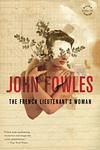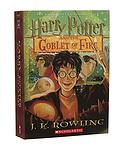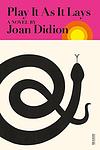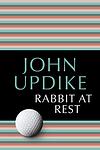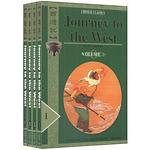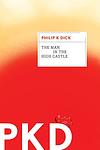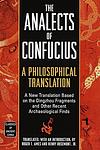The Greatest Books of All Time
Click to learn how this list is calculated.
This list represents a comprehensive and trusted collection of the greatest books. Developed through a specialized algorithm, it brings together 280 'best of' book lists to form a definitive guide to the world's most acclaimed books. For those interested in how these books are chosen, additional details can be found on the rankings page.
Genres
Countries
Date Range
Reading Statistics
Click the button below to see how many of these books you've read!
Download
If you're interested in downloading this list as a CSV file for use in a spreadsheet application, you can easily do so by clicking the button below. Please note that to ensure a manageable file size and faster download, the CSV will include details for only the first 500 books.
Download-
476. The French Lieutenant's Woman by John Fowles
Set in the Victorian era, the story revolves around a complex love triangle involving a gentleman engaged to a well-bred woman and his infatuation with a mysterious woman known as the French Lieutenant's Woman. This woman, shrouded in scandal and mystery, challenges the protagonist's conventional views of society and morality. The novel, known for its metafictional style, explores themes of freedom, responsibility, and the oppressive social norms of the time.
-
477. Harry Potter and the Goblet of Fire by J. K Rowling
In this fourth installment of a popular fantasy series, a young wizard finds himself unexpectedly entered into a dangerous tournament between rival schools of magic. He must compete in a series of challenging tasks, including a deadly dragon chase and a terrifying underwater rescue mission. Meanwhile, he's dealing with regular teen issues like crushes, jealousy, and school dances. But as he unravels the mystery behind his selection for the tournament, he uncovers a dark plot that puts his life in danger and hints at the return of a powerful dark wizard.
-
478. Tartuffe by Molière
This classic French play revolves around the character Tartuffe, a hypocritical and cunning man who pretends to be deeply pious and religious. He manages to deceive Orgon, a wealthy family patriarch, into believing in his piety. Orgon is so taken in by Tartuffe that he decides to marry him off to his daughter, despite her love for another man. The family works together to expose Tartuffe's true nature, leading to a series of comic and dramatic events. The play is a satirical critique of religious hypocrisy and gullibility.
-
479. Charlie And The Chocolate Factory, by Roald Dahl
A young boy named Charlie lives in poverty and dreams of visiting the nearby chocolate factory owned by the eccentric and mysterious Willy Wonka. When Charlie finds one of the five golden tickets hidden in chocolate bars worldwide, he earns the chance to tour the factory. Accompanied by his Grandpa Joe and four other children, Charlie embarks on a magical and surreal adventure inside the factory, where he learns valuable lessons about greed, arrogance, and honesty.
-
480. Flowers for Algernon by Daniel Keyes
The book is a poignant science fiction narrative that follows the life of Charlie Gordon, a man with an IQ of 68, who undergoes an experimental surgical procedure intended to increase his intelligence. The story is told through Charlie's progress reports, which initially showcase his limited comprehension and writing ability. As the treatment takes effect, Charlie's intelligence surpasses that of the average person, leading to a dramatic increase in his understanding of the world, relationships, and his own past. However, the transformation is not without its pitfalls, as Charlie grapples with the emotional and social implications of his newfound abilities, and the impermanence of the experiment's success becomes a haunting reality. The novel explores themes of intellect, human dignity, and the ethics of scientific experimentation.
-
481. A Handful of Dust by Evelyn Waugh
Set in the 1930s, this novel explores the disintegration of the marriage of an upper-class English couple, Tony and Brenda Last. Brenda embarks on an affair with a social climber, John Beaver, leading to the demise of her marriage. After their son's tragic death, Brenda demands a divorce and a large portion of Tony's estate. Tony, heartbroken, embarks on an ill-fated expedition to the Brazilian jungle. The novel critically examines the moral decay of British aristocracy and society.
-
482. Casino Royale by Ian Fleming
A British secret agent is tasked with bankrupting a French communist and paymaster of a Russian secret agency at a high-stakes card game in a casino. As he navigates the dangerous world of espionage, he encounters a beautiful woman who is being blackmailed by the enemy. The agent must outwit his opponents and survive numerous attempts on his life, all while grappling with his growing feelings for the woman.
-
483. The Sheltering Sky by Paul Bowles
"The Sheltering Sky" is a novel about an American couple, Port and Kit Moresby, who travel to the North African desert accompanied by their friend Tunner. The journey, initially an attempt to cure their marital woes, quickly descends into a harrowing journey of self-discovery and exploration of the human condition. As they move further into the desert, the harsh environment and their isolation from the outside world push them to their psychological limits, leading to devastating consequences.
-
484. Play It As It Lays by Joan Didion
The novel centers around a woman named Maria Wyeth, a former model and actress, who is drifting through life in the 1960s Hollywood scene. As she struggles with a failing marriage, a difficult relationship with her daughter, and a career that's spiraling downwards, she grapples with existential despair. Told in a series of fragmented narratives, the story reveals Maria's mental breakdown, her self-destructive behavior, and her desperate attempts to find meaning in a seemingly meaningless world.
-
485. Solaris by Stanislaw Lem
The novel is a psychological exploration of human limitations and failures set against the backdrop of space exploration. When a psychologist arrives at a research station orbiting a distant planet covered entirely by a sentient ocean, he discovers the crew in disarray, haunted by physical manifestations of their subconscious fears and desires. As he grapples with the ocean's inscrutable nature and its unsettling ability to materialize human thoughts, he is forced to confront his own guilt and regret, embodied by the apparition of his deceased wife. The story is a philosophical meditation on the impossibility of truly understanding alien intelligence and the painful isolation of the human condition.
-
486. Barchester Towers by Anthony Trollope
"Barchester Towers" is a satirical novel that explores the power struggles within the church and aristocracy of a fictional English cathedral town. The story centers around an ecclesiastical power struggle following the death of the Bishop of Barchester, with the bishop's son, Archdeacon Grantly, and a newly appointed bishop, Dr. Proudie, vying for control. The novel also follows the romantic endeavors of Eleanor Bold, a young widow who becomes the object of affection for multiple suitors. The narrative is filled with political maneuvering, social intrigue, and commentary on Victorian society.
-
487. Three Men in a Boat by Jerome K. Jerome
Three Men in a Boat is a comedic account of a two-week boating holiday on the Thames River from Kingston upon Thames to Oxford and back to Kingston. The story follows three friends and a dog who decide to take a trip to cure their hypochondriac symptoms. The journey is filled with humorous incidents, historical digressions, and comical misunderstandings. Despite their initial intentions, the trio's holiday turns into a series of misadventures, providing a light-hearted commentary on the English upper-middle class at the end of the 19th century.
-
488. Melmoth the Wanderer by Charles Robert Maturin
"Melmoth the Wanderer" is a gothic novel that tells the story of John Melmoth, a man who sells his soul to the devil for 150 extra years of life, and spends that time wandering the earth in search of someone who will take over the pact for him. The narrative is a complex series of nested stories, told by many different characters, and it explores themes of guilt, redemption, and the inherent evil of mankind.
-
489. Rabbit at Rest by John Updike
The novel is a final look into the life of Harry "Rabbit" Angstrom, a former high-school basketball star, now in his mid-fifties, overweight and grappling with several health issues. Despite his success in business, his personal life is in shambles, with his wife addicted to alcohol and his son to drugs. Harry, struggling with his mortality, is trying to understand his past and make sense of his future, while dealing with the changing American society and the consequences of his own choices.
-
490. The Vicar of Wakefield by Oliver Goldsmith
"The Vicar of Wakefield" follows the life of Dr. Primrose, a vicar living happily with his wife and six children in an affluent English parish. However, their lives take a drastic turn when they lose their fortune and are forced to move to a new, more modest parish. Despite facing numerous hardships, including the imprisonment of Dr. Primrose and the abduction of his daughter, the family remains resilient, relying on their faith and love for each other to overcome adversity. The story is a classic portrayal of family values, resilience, and the triumph of virtue over vice.
-
491. Journey to the West by Wu Cheng'en
"Journey to the West" is a classic Chinese novel that follows the adventures of a Buddhist monk and his three disciples, a monkey, a pig, and a river monster, as they travel from China to India in search of sacred Buddhist scriptures. Along the way, they face a series of challenges and obstacles, including battling demons and overcoming their own personal weaknesses. This epic tale is a blend of mythology, folklore, and fantasy, and is also a commentary on the practice and principles of Buddhism.
-
492. The Man in the High Castle by Philip K. Dick
Set in an alternate history where the Axis powers won World War II, this novel explores life in a world where the United States is divided into three parts: the Pacific States of America, controlled by Japan; the Rocky Mountain States, a neutral buffer zone; and the United States of America, controlled by Nazi Germany. The story follows several characters, including a jewelry designer, a trade minister, and a German secret agent, as they navigate this dystopian reality. The narrative is further complicated by the existence of a banned novel that depicts an alternate reality where the Allies won the war, causing characters to question their understanding of reality.
-
493. Poems of W. H. Auden by W. H. Auden
This book is a collection of poems by a renowned 20th-century poet. The poems cover a wide range of themes, including love, politics, religion, and the human condition. The poet's unique style combines traditional forms with modernist free verse and his work is known for its technical achievement, emotional depth, and engagement with moral and political issues. The collection provides an overview of the poet's career, showcasing his development and evolution as a writer.
-
494. Analects by Confucius
The Analects is a collection of sayings and teachings attributed to the Chinese philosopher Confucius and his disciples. The book emphasizes the importance of personal and societal morality, filial piety, and the cultivation of knowledge and virtue. Confucius stresses the importance of leading by example and treating others with respect and kindness. The Analects has had a profound impact on Chinese culture and philosophy, and its teachings continue to be studied and applied today.
-
495. Hopscotch by Julio Cortázar
This avant-garde novel invites readers into a non-linear narrative that can be read in two different orders, following the life of Horacio Oliveira, an Argentine intellectual living in Paris with his lover, La Maga. The story explores philosophical and metaphysical themes, delving into the nature of reality and the human condition, while also examining the struggles of intellectual and emotional life. The second part of the novel takes place in Buenos Aires, where Horacio returns after La Maga disappears, and where he grapples with his past, his identity, and his place in the world.
-
496. The House of the Seven Gables by Nathaniel Hawthorne
This novel revolves around the cursed Pyncheon family, who live in a gloomy New England mansion, cursed due to the actions of their ancestor who had an innocent man hanged as a witch to seize his property. The story explores themes of guilt, retribution, and atonement, and the narrative is interspersed with the author's philosophical musings. The present-day Pyncheons include an old maid, a daguerreotypist, and their elderly, reclusive cousin who returns to the house after a mysterious absence of many years.
-
497. The Breakfast of Champions by Kurt Vonnegut
The novel is a satirical depiction of American society, with a particular focus on its materialism, business culture, and obsession with success. It tells the story of two men: Dwayne Hoover, a wealthy businessman who is gradually losing his sanity, and Kilgore Trout, a largely unsuccessful science fiction writer. Their lives intersect in a series of absurd, tragicomic events, leading to a climax that forces the reader to question the nature of free will and the meaning of life. The narrative is punctuated by the author's own illustrations and frequent digressions on a wide range of topics.
-
498. The Devil to Pay in the Backlands by Joao Guimaraes Rosa
"The Devil to Pay in the Backlands" is a complex narrative that follows the life of a Brazilian sertanejo (backlands dweller) who becomes a bandit and a feared killer. Tormented by his violent actions, he embarks on a metaphysical journey, wrestling with philosophical and religious questions, and trying to reconcile his deep belief in fate and predestination with his own free will. The book is notable for its innovative language, blending regional dialects with neologisms and classical references, which adds to its rich portrayal of the Brazilian backlands.
-
499. The Confusions of Young Törless by Robert Musil
This novel explores the moral and psychological development of a young student sent to a military boarding school in Austro-Hungarian Empire. The protagonist witnesses and participates in the bullying and humiliation of a fellow student, leading him to question the nature of power, morality, and the thin line between civilization and barbarity. The book is a profound exploration of adolescence, authority, and the loss of innocence.
-
500. The Nicomachean Ethics by Aristotle
This philosophical work focuses on the concept of ethics, specifically virtue ethics, and how it relates to a person's character and happiness. The author argues that happiness is the highest good and the end goal of life, and that it is achieved not through pleasure, but through virtuous actions. The book also explores the nature of practical reasoning, the different kinds of virtues, the importance of friendship, and the role of luck in human welfare.
Reading Statistics
Click the button below to see how many of these books you've read!
Download
If you're interested in downloading this list as a CSV file for use in a spreadsheet application, you can easily do so by clicking the button below. Please note that to ensure a manageable file size and faster download, the CSV will include details for only the first 500 books.
Download